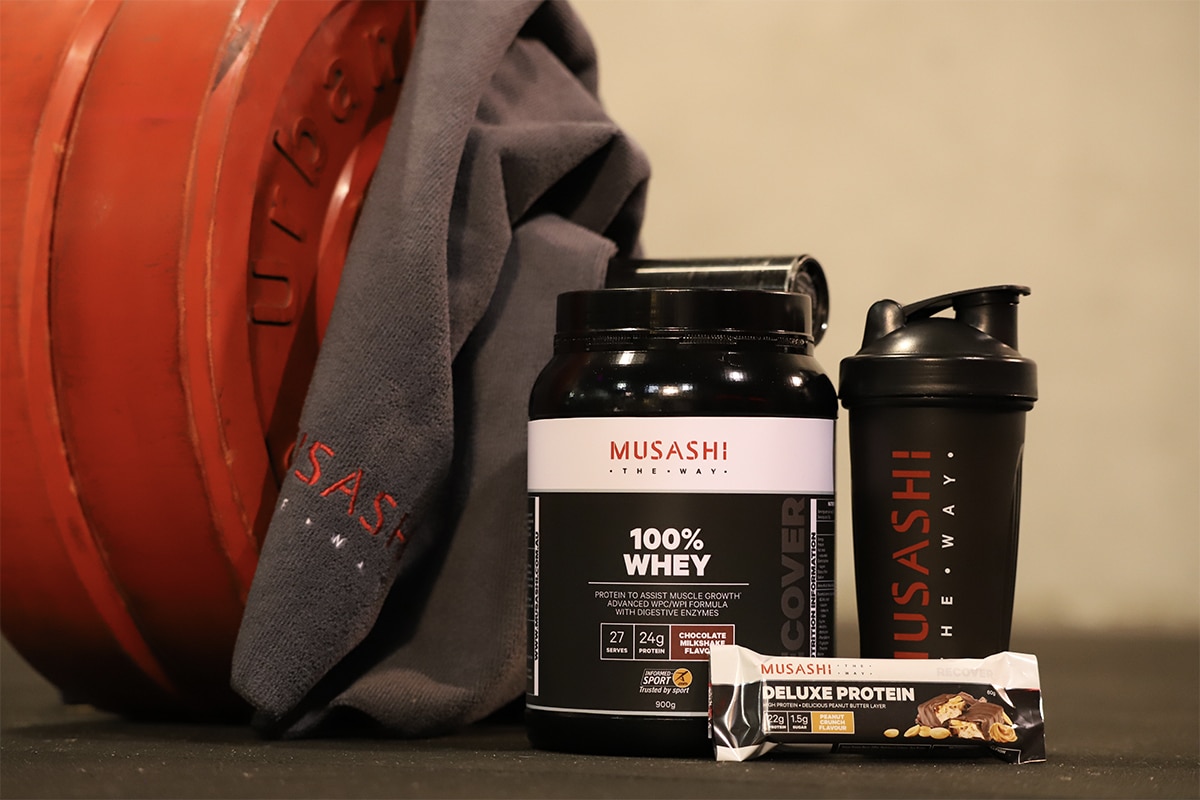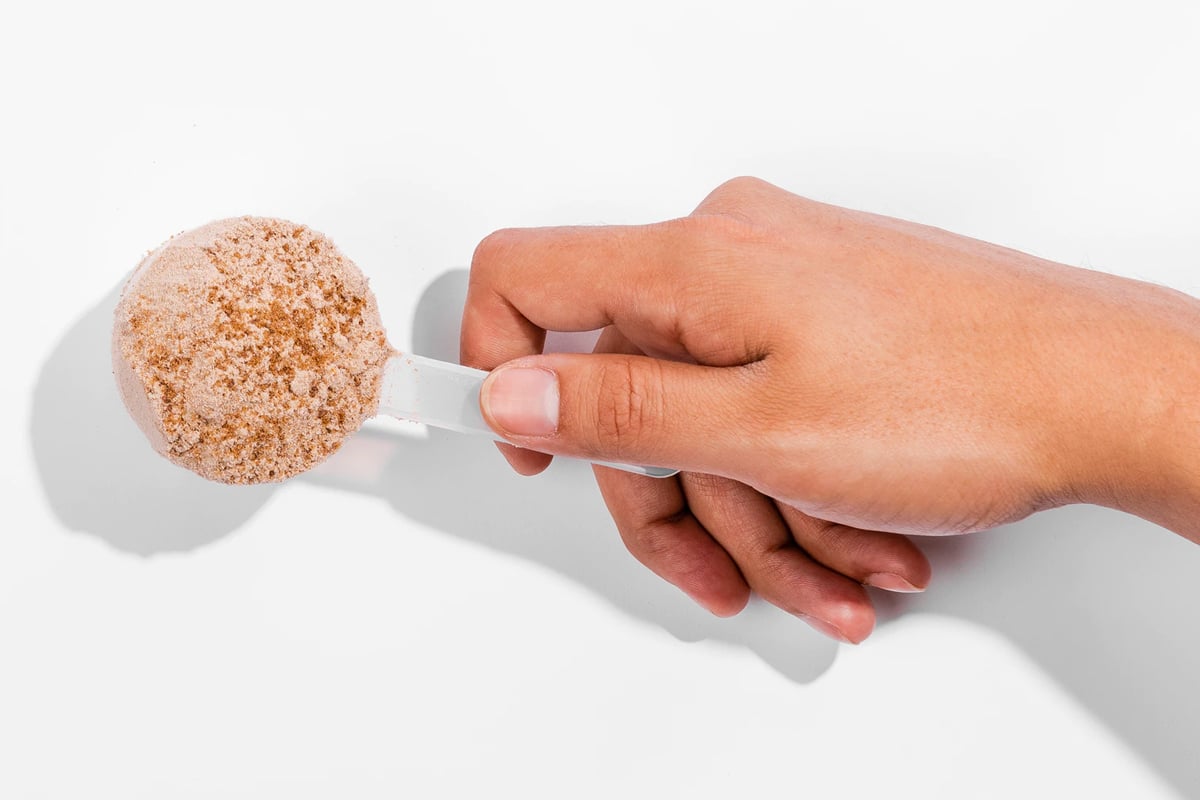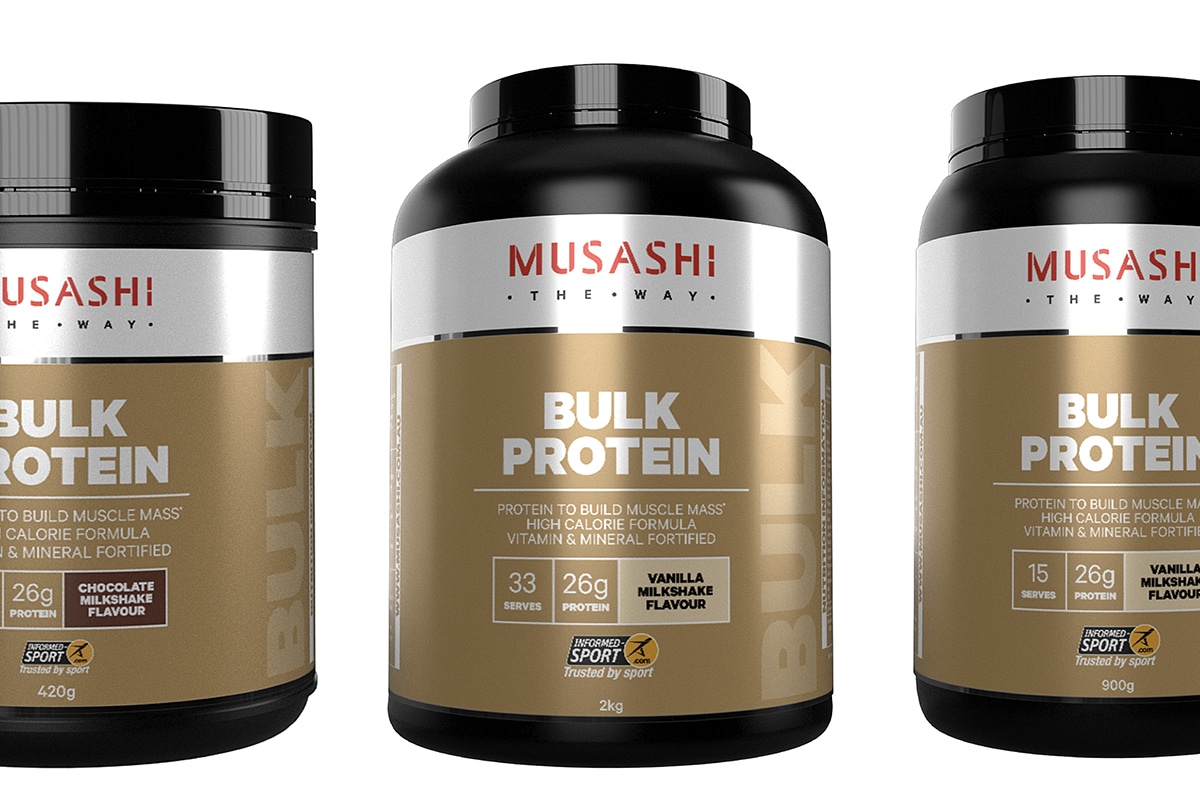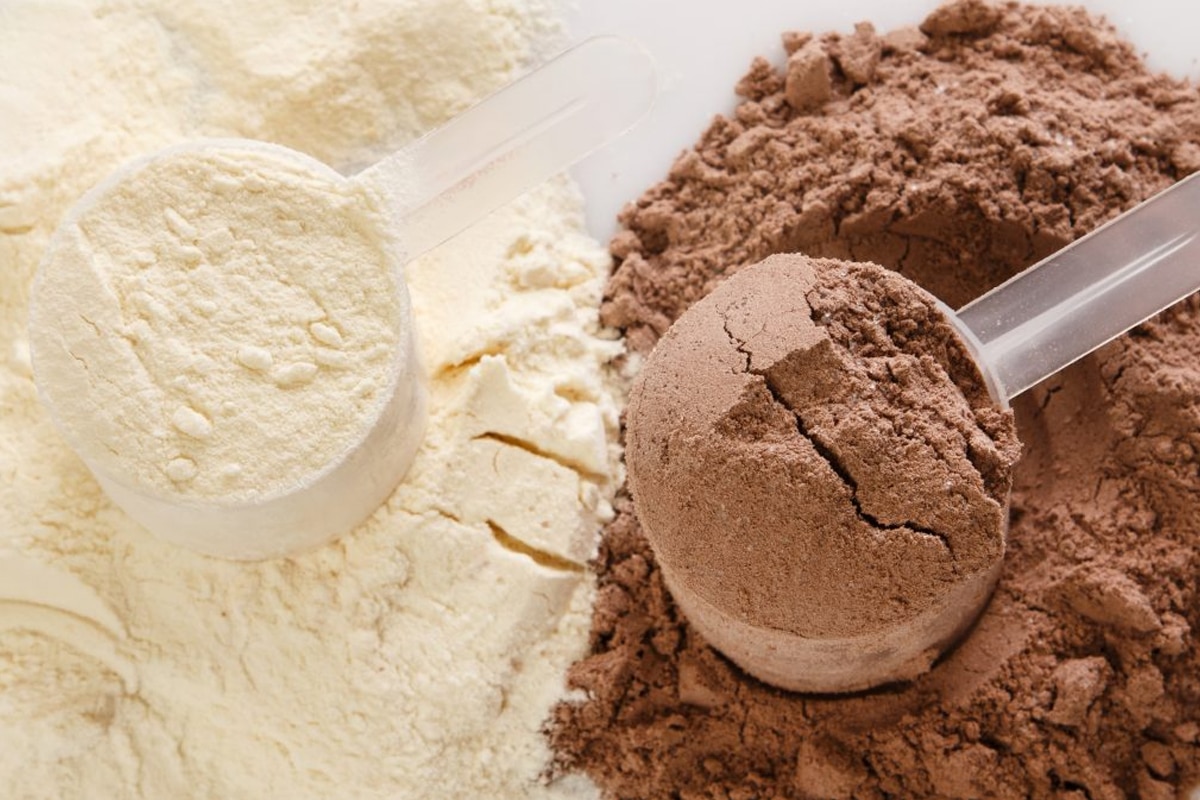
Published:
Readtime: 7 min
Every product is carefully selected by our editors and experts. If you buy from a link, we may earn a commission. Learn more. For more information on how we test products, click here.
Sirloin steak or protein shake? That is the question. Well, one of them anyway. And by the time you’ve finished this article, you’ll know the answer. The underlying theme, of course, is protein. A vital macronutrient (alongside carbs and fat), protein consists of three types of amino acids, i.e. organic compounds that help enable various bodily functions. One of those types is essential amino acids, which the body can’t produce on its own. Thus, we eat protein.
To answer all your protein-related questions, we sought help from one of Australia’s foremost authorities on the subject: Musashi. Since 1987, the sports nutrition brand has been developing fitness supplements from the highest-quality ingredients. Employing strict quality control and rigorous scientific research, they offer some of the best powders, capsules, and bars that money can buy. Not only that, but they frequently provide educational resources on the subject of sports nutrition, diet, and fitness. Suffice it to say, you’re in good hands!
Without further delay, here are all your protein questions answered:

What Does Protein Do?
What doesn’t protein do, is more like it! Seriously though, protein (and amino acids) performs all kinds of important tasks inside you. That includes the following:
- Makes up your hair, bones, nails, and muscles
- Functions as an energy reserve when you’ve burned through carbs and fats
- Retains muscle health even as you lose weight
- Assists with muscle recovery
- Improves bone health
- Increases the effectiveness of your immune system
- Helps boost metabolism and reduce cravings

What is the Best Source of Protein?
Protein’s main function is to deliver essential amino acids into the body, thereby assisting with a host of vital benefits. The best protein sources are the ones known as a ‘complete protein,’ in that they possess the recommended amount of all nine essential amino acids. Examples include eggs, fish, meat, and whey protein sources such as Musashi’s 100% Whey protein powder.

What’s Better for You: Protein Supplements or Real Food?
Modern athletes often incorporate both protein-rich whole foods and powder-based supplements into their diet and that’s because your body has room for both. If you simply had to choose one over the other, go with whole foods because they’ll provide additional nutrients like iron and magnesium.
However, protein powders also bring forth their own unique tier of benefits. For instance, they can be digested more quickly post-workout, thereby expediting muscle recovery. They’re also far more convenient and cost-effective than pretty much any ethically-sourced, whole food counterpart.
Meanwhile, protein supplements such as Musashi Bulk Protein Powder don’t just contain a blend of high-grade multi-source protein and readily-absorbed carbs, but come additionally fortified with vitamins and minerals. It’s also enhanced with naturally-occurring essential amino acids (EAAs) and branched-chain amino acids (BCAAs), covering a ton of ground as a result.
In summary, the answer is that there’s room for both sources in your diet and one is not innately better than the other. Our suggestion to use protein powders in tandem with your workout schedule (to prepare for training and/or to aid with muscle recovery) or in between meals because they’re easier to consume and quicker to act. But when it’s time to sit down for dinner, help yourself to a mineral-rich steak of salmon.

What Should One Look for in a Protein Powder?
No two people are exactly the same nor are their diets and fitness goals. Hence, the protein powder that’s right for you might not be right for the next guy. That said, most athletes agree that whey protein makes for a solid jumping-off point. Known for its fast-absorbing qualities, whey also promotes an increase in amino acids to help with muscle repair.
Yet even whey protein takes a number of forms. The two most popular are whey protein isolate (WPI) and whey protein concentrate (WPC), both of which come from the protein liquid that’s leftover when milk is converted into cheese. Here’s a quick breakdown:
- Whey Protein Isolate (WPI) is rapidly digested and often considered the best type of protein powder, as it contains 90% protein, a low level of lactose, and low amounts of carbs and fat. It’s also a ‘complete protein,’ meaning it contains each of the nine essential amino acids.
- Whey Protein Concentrate (WPC) is high in immunoglobulins and usually better-tasting (and more affordable) than WPI. It contains approximately 80% protein, fat-soluble vitamins, and higher levels of lactose than WPI.
Remember, the best type of protein powder will vary depending on your personal fitness goals. Different formulations of protein (i.e. with or without certain additives/ingredients) make the powder appropriate for different pursuits. A bulking protein will be high in carbs, while a shredding protein may contain ingredients like carnitine. Here’s a quick reference guide:
- If you want to build mass…check out Musashi Bulk, which contains both whey protein and carbs.
- If you want to lose weight…you’ll want a protein powder like Musashi Shred & Burn, which contains active ingredients like caffeine, green tea, and carnitine.
- If you’re looking for a complete protein source…Musashi’s 100% Whey is an ideal place to start. Containing a synergistic combination of WPC and WPI, its low-carb formula has been scientifically designed to support muscle growth and other sports nutrition needs.
Most protein powders feature many ingredients, each serving a unique function. Examples include casein, milk powder, soy lecithin, soy protein, carbs, and ergogenic ingredients like creatine, carnitine, and green tea. To learn more about these ingredients and their respective functions, check out Musashi’s article on protein powders.

How Are Protein Powders Made?
Being that whey is the main ingredient found in most protein powders, we’ll focus on its production. When the curd is removed from milk during the cheese-making process, whey is the liquid that remains. Next, whey protein is separated and purified by way of varying techniques, which generate different concentrations. The whey protein liquid is then dried using both hot and cold air. As a result, the solids separate from the liquids, forming a powder. That powder is flavoured and packaged for public consumption.
As one might expect, not all protein powders are created equal. Producing a high-quality whey powder requires copious amounts of scientific research, testing, and innovation. Musashi makes their products in state-of-the-art manufacturing facilities that meet the strictest quality standards. Their powders are formalised, traceable, and practical, and every ingredient is supported by science. You can learn more about the brand’s trusted methods by clicking here.

How Much Protein Should One Consume and When’s the Best Time to Consume It?
According to most experts, adult males should consume a minimum of 0.8 grams of protein per kg of bodyweight, and 1-2 grams for athletes. On average, adult males should be eating 56 grams (at a bare minimum) of protein per day, though naturally that number can rise or fall based on personal metrics. For instance, men who maintain an intense workout schedule should arguably consume more protein so as to aid with muscle recovery.
Your average protein shake will contain 25-30 grams of protein per serving. Research indicates that it may not make much of a difference whether you consume protein powders or bars before or after a workout. However, some experts will say that the best time to consume a protein shake is about 30-60 minutes after exercise, so as to promote muscle recovery.
On the other hand, there are specific powders and supplements to help bolster your body before a workout. Take Musashi Pre-Workout, for example, which blends targeted ingredients and amino acids to function as a pre-workout catalyst.

Is There Such a Thing as Too Much Protein?
The current consensus is that a high-protein diet is generally safe for most people, especially those who exercise and lift weights. Modern athletes will often use protein shakes between meals to supplement their intake, and eat protein-rich food sources as well. However, don’t take that as an excuse to go overboard. A balanced diet is still a proper diet, as far as most nutritionists are concerned.
































Comments
We love hearing from you. or to leave a comment.